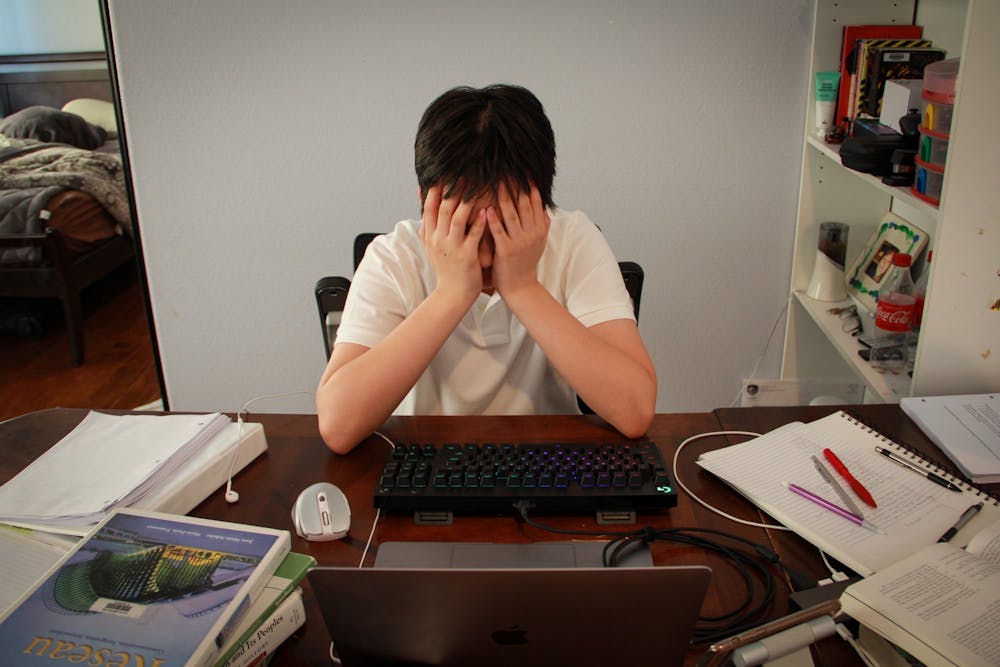
Some students in STEM have had to drop classes because of increased workload.
Credit: Stephanie Jungyeon NamBurdened by the combination of synchronous class sessions and pre-recorded lectures, students in STEM classes said they are spending more time "in class" than in a typical in-person semester.
Professors have the option to conduct their classes synchronously during the allotted class time, asynchronously through pre-recorded videos and assignments, or a combination of both. Some STEM classes, however, are requiring students to attend lectures asynchronously in addition to attending the synchronous sessions. The increased workload and time "in class" has forced students to drop classes, work fewer hours at their jobs, and hone their time-management skills.
Engineering first year Christa Simaan said the combination of asynchronous lectures, synchronous meetings, and individual assignments in her classes requires her to spend over 18 hours each day working at the desk in her bedroom.
“There are so many asynchronous [videos], but synchronous [videos] on top of it, so it’s almost like double lecture,” Simaan said.
Her classes include MATH 104: Calculus I, CIS 110: Introduction to Computer Programming, and PHYS 150: Principles of Physics I: Mechanics and Wave Motion.
For the first unit in PHYS 150, which spanned over two weeks, Simaan said she was required to watch about 18 hours of pre-recorded lectures. In one week, she watched nine hours of pre-recorded lectures in addition to attending a two-hour synchronous session.
Her heavy workload this semester has forced her to significantly decrease the number of hours she works each week at Chick-fil-A in Greensboro, N.C. In her senior year of high school and throughout this summer, Simaan worked 35 hours a week. Now, she is only able to get in a few shifts each week.
College first year Bella Whittaker agreed PHYS 150's workload “seems like more than normal" due to the work required outside of synchronous sessions.
"The Department of Physics and Astronomy and each faculty member has worked tirelessly to balance providing our students with a world-class education with the realities imposed by our current delivery model," Physics and Astronomy Department Chair Mark Trodden wrote in an email to The Daily Pennsylvanian. "Student workloads are something we have paid close attention to, and feel that, on balance, are arranged appropriately."
Engineering first year Cindy Xu also described PHYS 150 and MATH 114: Calculus II as overwhelming and time-consuming. In order to stay on track in all of her classes, Xu said she divides her time by focusing on asynchronous content over the weekend and attending synchronous meetings and completing assignments during the week.
Similar to PHYS 150, College junior Lealem Aderie said he normally spends more time for PHYS 101: General Physics: Mechanics, Heat, and Sound than the time allotted in students' schedules. In addition to mandatory synchronous sessions to work on problem sets, PHYS 101 students must take weekly quizzes, complete weekly homework, and watch asynchronous lectures to learn all the material.
For the past two semesters, Aderie said he has been able to take five classes without any problems managing the work load. This fall, the extra time required for his STEM classes, however, has forced him to drop one of his five classes in order to attend all synchronous and asynchronous classes as well as complete other assignments.
Executive Director of the Center for Teaching and Learning Bruce Lenthall said that for online learning, some professors have adapted their class to feature frequent, low-stake assignments to keep students engaged with the course. These frequent assignments greatly contrast the typical structure of many STEM classes which only feature two to three midterms and a final exam.
"On a daily basis, [frequent, low-stake assignments] demand that you stay on top of things, but you never get that cramming period [for high-stake exams]," Lenthall said. "I think [workload] probably does overall come out pretty similarly, but it structures your time rather differently and the students aren’t prepared for that."
Some students in other STEM classes, however, have not experienced an increase in work due to the online semester.
College first year Stanley Chen said the workload for CHEM 053: General Chemistry Laboratory I is reasonable and seems comparable to the workload of the in-person class. College first year Aubrey Welch, who is also taking CHEM 053, agreed, adding that the classwork includes assignments based on the lectures, lab reports, and weekly quizzes, which have all been manageable.
Lenthall said that students with a lot of class time are most likely feeling the effects of online learning and Zoom fatigue, urging professors to orient their courses around the key ideas they want their students to learn and use live class time wisely.
"This is a difficult time for a lot of students and we all have to be cognizant of that," he said.
The Daily Pennsylvanian is an independent, student-run newspaper. Please consider making a donation to support the coverage that shapes the University. Your generosity ensures a future of strong journalism at Penn.
Donate






